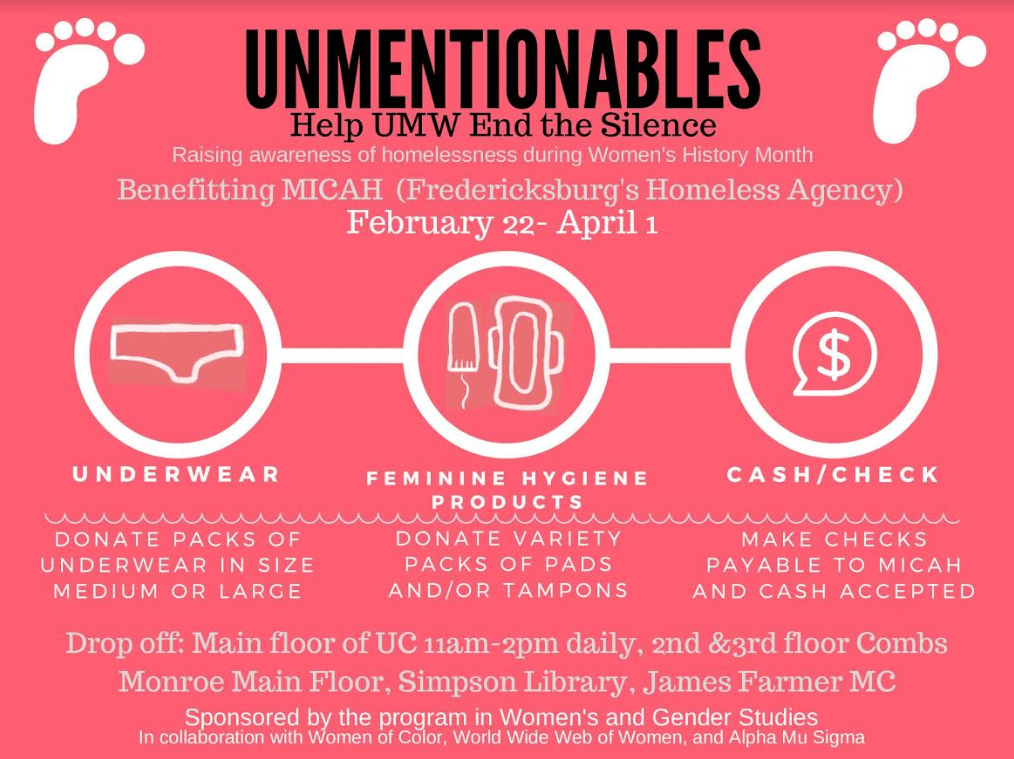Department and clubs come together for a drive to benefit women
4 min read
UMW ORCA TV
By SHAWNYA PETESON
In the coming weeks, if you see pink boxes around campus marked “Unmentionables,” contrary to the box’s message, the organization behind the boxes definitely wants you talk about them. Sponsored by the Women’s and Gender Studies department in celebration of Women’s History Month, the Unmentionables project is a drive to collect donations of feminine hygiene products, women’s underwear and monetary contributions of cash or check.
All of the offerings gleaned from the several donation drop-boxes across campus will go to benefit Micah, a non-profit homeless shelter in downtown Fredericksburg that aims to help those in need.
Allyson Poska of the history department, one of the organizers of the drive, says that the idea of a feminine hygiene products drive began after her colleague, María-Laura Bocaz of the Spanish department, approached her with the idea after working with Micah over the summer. Bocaz and Poska joined forces with Kristin Marsh of the department of sociology and anthropology as well as Lauren Rainford, senior history major and ICA President, to start this drive.
Rainford spoke of her choice to join the project stemming from encountering firsthand accounts of the dire choices many are faced with.
“A few weeks ago I saw a video of an interviewer asking homeless women what it was like to have their periods on the street,” Rainford said. “Some said that because tampons are so expensive, they frequently go without meals in order to pay for these sanitary items… this should never be a decision that a woman needs to make.”
She continued, “Later, I was talking to Dr. Poska in her office hours about my thesis when she mentioned that a colleague was working on a drive to collect feminine hygiene products for homeless women in Fredericksburg. I offered my connections as ICA President to support the cause in any capacity that I could.”
When asked about where the name “unmentionables” came from, Poska responded, “We really wanted to find a catchphrase that brought awareness to the issue of homelessness, which is rarely talked about in our community, and dovetailed with the items we hoped to collect. Unmentionables seemed to fit the bill perfectly.”
Rainford echoed Poska’s sentiment, talking about the deeper meaning behind the tongue-in-cheek name. “People are uncomfortable talking about tampons, pads, underwear and especially homelessness along with the problems it brings about for women,” Rainford said. “We want to encourage conversations about homelessness to raise awareness to its impact on our community at large… we all tried to come up with something witty or comedic to garner as much notice from college students as possible.”
To assist in the Unmentionables project, the organizers reached out to groups whose missions they believed align with goal of the donation drive, including Alpha Mu Sigma, Women of Color, UMW Young Democrats, Feminists United and World Wide Web of Women.
“These organizations have a history of dedication to the overall Fredericksburg community, especially in regards to women’s aid projects,” Rainford says. Throughout March, volunteers from each of these groups will take turns tabling for donations in the University Center.
The efforts to better the lives of homeless women in the Fredericksburg area are also being combined with efforts to aid students within the UMW community. At the table, representatives from the many clubs supporting the drive will be collecting donations, and people will also be able to sign a petition urging the administration to provide feminine hygiene products in the University Center and the HCC for students, free of charge.
Rainford spoke of the importance of making sure that feminine hygiene products are made easily accessible. “Women don’t get to choose what happens to them,” Rainford said. “There’s a popular misconception that homelessness is self-inflicted but this is rarely ever the case… Women also don’t get to put their periods on hold anytime they run out of tampons.
“Homelessness and periods are stigmatized and both perceived to be dirty and taboo. As a feminist and a member of our community, I believe that we should all be concerned with assisting women in need of assistance.” She continued, “Because sanitary products are so expensive—a whole other conversation— women are unable to take care of both their dietary and sanitary needs. This is totally unacceptable and I believe we can all help and make a difference.”
Poska hopes that this project will become a recurring effort, serving not only to aid those in need, but also to connect the students, faculty and the greater Fredericksburg community—spheres, which can often feel distant from one another.
“We have tremendous talent and resources available, and it is our social obligation to use those talents and resources to help those who are less fortunate,” Poska said.
Anyone interested in participating in the drive is welcome to bring new boxes of pads, tampons or cash to any of the Unmentionables boxes, located in Simpson Library, Monroe Hall, Combs Hall or the UC, from Feb. 22 to April 1. People can also bring their donations to any university sponsored Women’s History Month events on campus throughout March. The schedule of events is available on the James Farmer Multicultural Center website.


